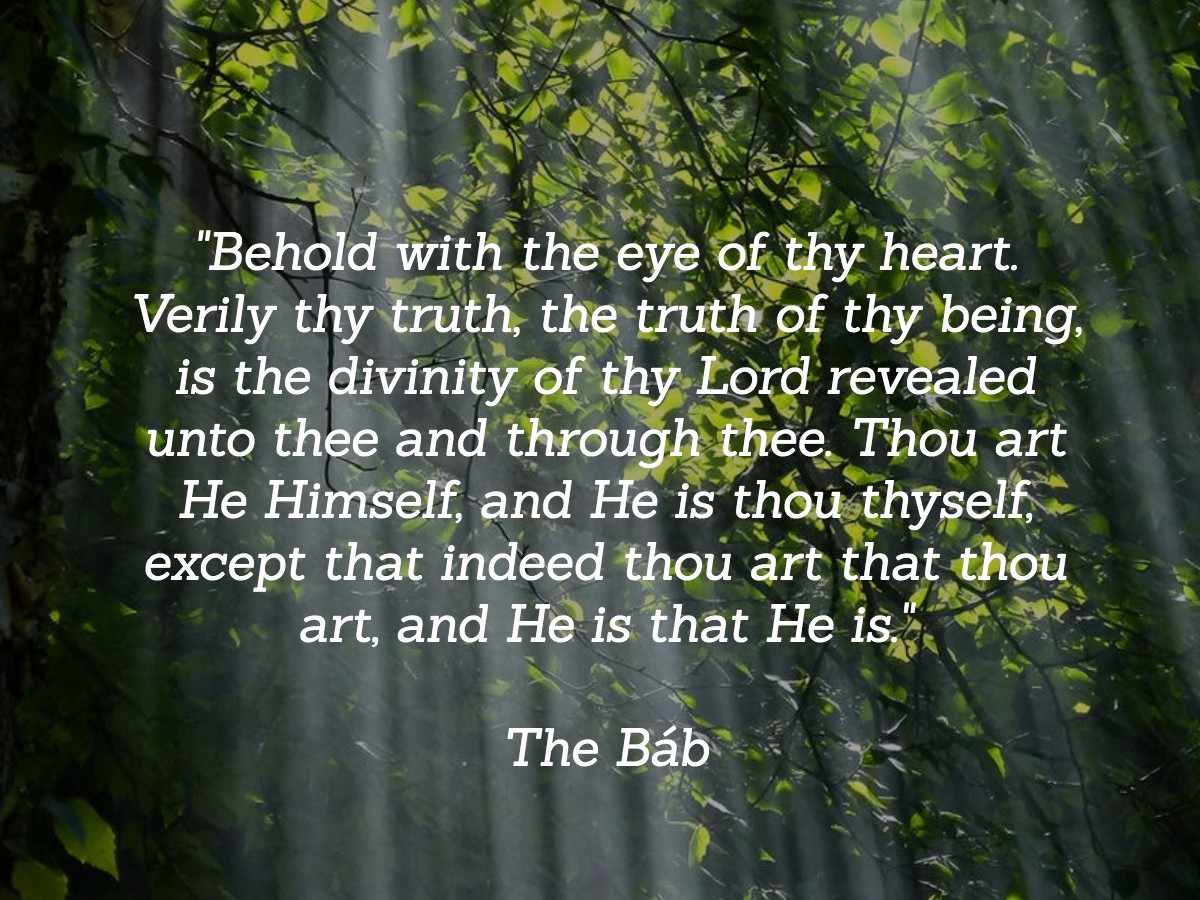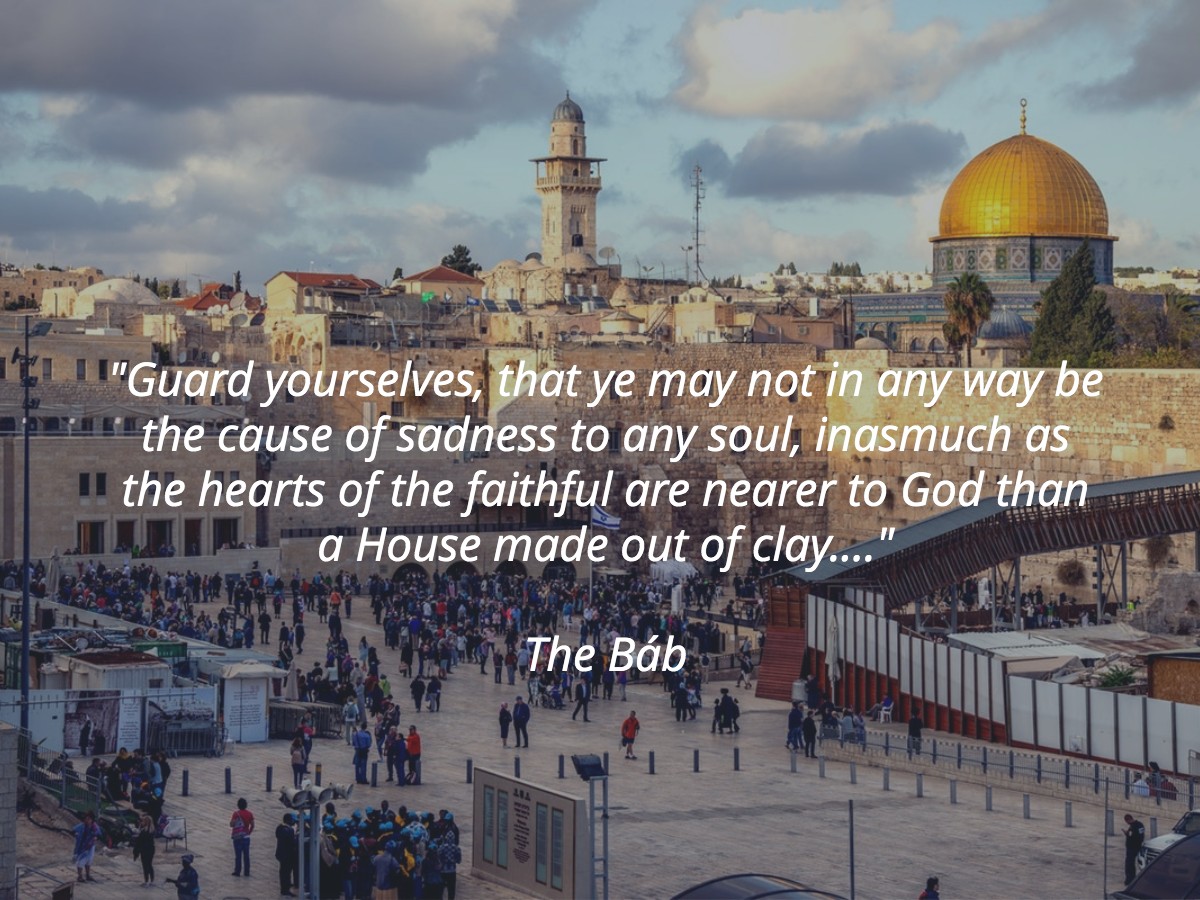The following essay continues our exploration of the Writings of the Bab, with a focus on the context of His revelation.
The 19th century was a critical time in the history of humanity, with forces that were receding and others being awakened, forces that now define our world. The biggest change was that economies shifted from being agricultural to being based on the industrial production of stuff. Whereas previously, the local and international economy was based on agricultural products and over 80% of human activity was devoted to securing food, the industrial economy allowed increasingly larger sections of society to devote themselves to industrial production. It made more things available and also made some people enormously wealthy. The downside was that people were now more vulnerable because they no longer raised their own food. Industrial economies had to grow or people would starve, or revolt, or both. For the leaders of human society- essentially a small group of European kings and queens, and the fledgling American democracy, the world became a supply house to feed their industrial machines. Imperialism and colonialism were not new in the 19th century, but they flourished and made Empires out of nations as European economies sought more raw materials and more markets to sell things. In the “colonies”- places like the entirety of Latin America, Africa, the American West, and India- the western powers fought over control of resources- cheap labor, the natural environment including crops and animals, and various forms of minerals. They fought with the native peoples and they fought with each other. They enslaved 20 million Africans, stole 93 trillion dollars of labor and profits out of India, put Native peoples onto “reservations”- and basically raped the world. We as 21st century people are still recovering from the evils of the 19th century- trying to figure out how to right the enormous wrongs and move forward as a civilization. Because of the changes in the 19th century, and the effect of colonialism and imperialism, we are now completely dependent on each other and a world industrial economy in which almost nobody raises their own food.
Now that we are all so dependent on each other, we need a system of interaction that prioritizes values and reflects our oneness- a system that is fair, just, and ensures the greatest good for the greatest number of people. There was very little among the major thinkers of the 19th century that was going to supply that. Scientific advances were certainly made- advances that laid the foundation for the explosion of science and technology in the 20th century. There was also the commitment to principle exhibited in certain individuals like Abraham Lincoln and the abolitionist movements of both Britain and America. A host of Christian groups flooded the world advocating for the poor and oppressed, setting up schools for children and promoting standards of sacred behavior. Undoubtedly, there were good guys throughout this whole period, people who saw what was happening but had little control to stop it.
Major thinkers of the 19th century- people who were essentially contemporaries with Baha’u’llah Himself- would come to have an enormous impact on humanity and changed the way intellectuals saw the world. Charles Darwin, the Victorian naturalist and brilliant scientist, described a world that was ancient, dynamic, evolving and inter-related. Unfortunately, it also appeared to be a world that no longer needed the God that people had previously conceived. His ideas were a major blow to the previous religious world-view. Darwin’s ideas of “survival of the fittest” were soon co-opted by ignorant imperialists who gave them seeming justification for the mass enslavement and oppression of peoples world-wide. Nietzsche’s struggles with faith led to his re-conception of human excellence as a form of “superman”- whose primary goal was to live without bounds and obtain mastery over others. No longer limited by Christian compassion, his ideas were a great inspiration to the Nazis. Sigmund Freud was born in 1856, and founded the theory of psychoanalysis, in which humans were primarily motivated by their basest of instincts. Though it produced some helpful therapeutic insights, the view of humans and competitive and sex-obsessed was dreary and dark, and nothing you could build a society on. Karl Marx and Friedrich Engels abhorred the industrial machine and the capitalists associated with it, and conceived of an economic world view that would put workers at the center of an egalitarian society. Their ideas fueled 20th century movements against imperialism around the world, but their inherent “materialism” left people without even a foundation to believe in ideals and principles. It was the State itself who replaced God in this atheistic philosophy. Endemic corruption characterized most of the societies inspired by Marxism. Turns out if you systematically take away everything that is transcendent from people’s lives, people then cheat to get a larger bit of the pie of wealth and influence- the only thing apparently left worth living for.
In sum, the entire world just had a horrible, terrible, and very bad century.
500 years from now, the Person that people will probably remember most from the 19th century is not any of these thinkers, though they will probably make an appearance in history books from time to time. The Person who will likely most define their lives was almost completely unknown to all the great thinkers, leaders, and both good and bad actors. He’s even still pretty unknown now.
From his prison cell, Baha’u’llah spoke with the voice of God, and viewed the spectacle before Him- summing it up in a few short sentences.
The winds of despair are, alas, blowing from every direction, and the strife that divideth and afflicteth the human race is daily increasing. The signs of impending convulsions and chaos can now be discerned, inasmuch as the prevailing order appeareth to be lamentably defective.
The “order” was defective and needed to be replaced because you couldn’t make a peaceful world out of the ideas and values of 19th century leaders and intellectuals. Baha’u’llah teaches us, maybe reminds us, that the basis of human societies is not material stuff, but a shared commitment to eternal and transcendent ideals. While Darwin and Freud would define humans in terms of their basest instincts- the instincts we share with animals- Baha’u’llah would proclaim the exact opposite. “To act like the beasts of the field is unworthy of man. Those virtues that befit his dignity are forbearance, mercy, compassion and loving-kindness towards all the peoples and kindreds of the earth.” He embraced the advance of “civilization”, stating “all men have been created to carry forward an ever advancing civilization”- but redefined it, putting those aspects of our nature that are most abstract, most transcendent, at the center.
The purpose underlying the revelation of every heavenly Book, nay, of every divinely-revealed verse, is to endue all men with righteousness and understanding, so that peace and tranquillity may be firmly established amongst them. Whatsoever instilleth assurance into the hearts of men, whatsoever exalteth their station or promoteth their contentment, is acceptable in the sight of God. How lofty is the station which man, if he but choose to fulfill his high destiny, can attain! To what depths of degradation he can sink, depths which the meanest of creatures have never reached! Seize, O friends, the chance which this Day offereth you, and deprive not yourselves of the liberal effusions of His grace. I beseech God that He may graciously enable every one of you to adorn himself, in this blessed Day, with the ornament of pure and holy deeds.
Pure and holy deeds. Deeds without attachment to their fruits, that aren’t primarily transactional but are performed only for the sake of lofty principles and sublime ideals- this is the stuff of a human being, the goal to be strived for. He asked the imperialists a question- “Are ye rejoicing in the things which, according to the estimate of God, are contemptible and worthless, things wherewith He proveth the hearts of the doubtful?”. He asked them if they really understood what they were prioritizing and its value- “Exultest thou over the treasures thou dost possess, knowing they shall perish? Rejoicest thou in that thou rulest a span of earth, when the whole world, in the estimation of the people of Bahá, is worth as much as the black in the eye of a dead ant?” Baha’u’llah taught us that the hoarding of wealth and the evils being inflicted upon the “peoples and kindreds” of the earth were a reflection of a lack of understanding, an ignorance of the true nature of things. Amassing wealth at the expense of others was an activity unworthy of human beings- “like unto the play of children”- and reflected their inherent weakness of character and deficiency of true wisdom.
He then invited the world to recognize the immense blessings that were being poured out for them in the form of a new divine revelation, a revelation that essentially disproved the idea of humans as materialistic animals-
Say: O friends! Drink your fill from this crystal stream that floweth through the heavenly grace of Him Who is the Lord of Names. Let others partake of its waters in My name, that the leaders of men in every land may fully recognize the purpose for which the Eternal Truth hath been revealed, and the reason for which they themselves have been created.”
Purely materialistic philosophies under-appreciated the reality of humans severely- “Cry aloud, ye that are of low aim! Wherefore have ye turned away from My holy and immortal wine unto evanescent water?”
More than anything, he taught that human societies flourish when they are united by common ideals- justice, fairness, and a commitment to unity. But now that the world was interdependent, we needed to see ourselves as one world. “The earth is but one country, and mankind its citizens”. Baha’u’llah told us that this is the wish of God himself– “He who is your Lord, cherisheth in His heart, the desire of beholding the entire human race as one soul and one body”.
So…this essay is actually about the Bab. But you can’t really understand the Bab unless you understand Baha’u’llah and His radical vision for humanity, so radical that 19th century thinkers of all forms couldn’t even conceive of it. It has only become more apparent as the decades have moved on, and reverberates strongly with people today- because it increasingly reflects the world we live in, or want to live in.
But divine revelations don’t just drop out of the sky- they come in the course of history, building upon and often radically redefining the concepts and ideas people understand. And they need to come in a way humans can understand at their time in history. Before Baha’u’llah could even address humanity, He needed people who could hear his vision, understand it, and promote it. He needed people who would regard Him as someone worthy to listen to. You are reading this essay right now because a small community of Baha’u’llah’s followers cherished His words, transcribed them, protected them, and passed them on to others in pure form. That community of followers did this because they were prepared, chastened, and led to the understanding of Baha’u’llah’s real station and mission by the Bab.
The Islamic society that the Bab came to was largely protected from the forces unleashed upon the world by the European powers. Islamic civilization had for centuries surpassed European civilization, but after 1700 or so, Europe woke up intellectually and technologically and the Ottoman and Persian Empires- the two great empires that made up most of Islamic civilization- were still stuck in the traditional structure and conceptions of the world. Changes were imminent though, and the grip of their governments on the people was tenuous. They also were flanked by the genteel but duplicitous Europeans who had eyes on their natural resources to feed the ravenous industrial machine.
The Bab could not have been more explicit about His mission- to prepare humanity for Baha’u’llah and His vision-
When the Daystar of Bahá will shine resplendent above the horizon of eternity it is incumbent upon you to present yourselves before His Throne. Beware lest ye be seated in His presence or ask questions without His leave…Beg ye of Him the wondrous tokens of His favor that He may graciously reveal for you whatever He willeth and desireth, inasmuch as on that Day all the revelations of divine bounty shall circle around the Seat of His glory and emanate from His presence, could ye but understand it.
In order to do that, He had to initially speak to their conceptions. Much of the Bab’s early Writings speak to a Persian Islamic worldview. It wasn’t until later in His revelation, when a community of people were radically attached to Him, did He declare, in much broader terms, the true features of His mission. He then transformed traditional religious ideas- the same ideas European thinkers were also rejecting- from something that was static, literalistic, and other worldly to a view that was dynamic, evolutionary, and part of our natural world.
His ideas set the stage for the new vision of religion and social reality that would unfold in the Revelation of Baha’u’llah.
Photo by Malcolm Lightbody on Unsplash. Internal workings of an old wind mill in the Netherlands.





